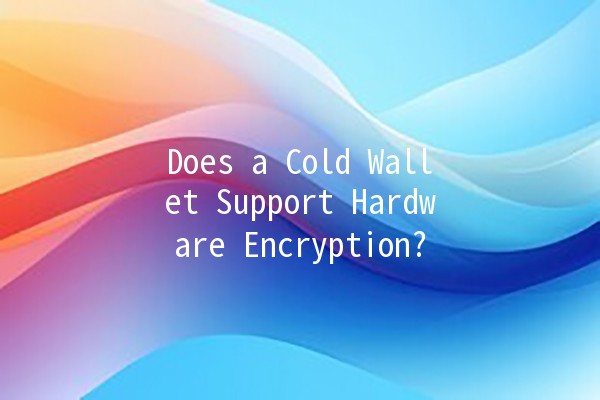
In the growing landscape of cryptocurrencies, the security of digital assets is a primary concern for users. One of the most effective ways to secure cryptocurrencies is through the use of cold wallets, which are offline storage solutions designed to keep your assets safe from online threats. An important question that arises in this context is whether cold wallets support hardware encryption. This article delves into the intricacies of cold wallets, the role of hardware encryption, and practical productivity tips for maximizing your cryptocurrency security.
Understanding Cold Wallets
Cold wallets, unlike hot wallets, are not connected to the internet. This isolation makes them significantly less vulnerable to hacking and malware attacks. The most common types of cold wallets include:
How Does Hardware Encryption Fit In?

Hardware encryption is a method where encryption occurs directly in a hardware device. It enhances security by ensuring that sensitive information, such as private keys, is never exposed to potential threats. Many hardware wallets incorporate hardware encryption to offer an extra layer of protection.
Benefits of Using Cold Wallets with Hardware Encryption
Techniques for Maximizing Your Cold Wallet Security
To further enhance your cryptocurrency security using cold wallets, consider the following techniques:
Explanation: Manufacturers often release firmware updates to fix vulnerabilities and enhance security features.
Practical Application: Regularly check for updates to your hardware wallet and apply them as soon as they are available. For example, if you use a Ledger wallet, log into the Ledger Live application regularly to ensure your device is running the latest firmware.
Explanation: A weak password can compromise even the most secure cold wallet.
Practical Application: Create strong, unique passwords for your wallet and related accounts. Use a password manager to generate and store complex passwords. For instance, avoid common phrases and include a mix of uppercase, lowercase, numbers, and special characters.
Explanation: Most hardware wallets provide a recovery seed, which is crucial for restoring access in case of loss or malfunction.
Practical Application: Write down your recovery seed and store it in a secure location, such as a safe. Avoid digital storage methods for this sensitive information. For instance, consider using a fireproof safe or a bank safety deposit box.
Explanation: Phishing attacks trick users into revealing sensitive information.
Practical Application: Always verify the sources of any communications suggesting actions related to your wallet. Be cautious of emails or messages prompting you to enter your private key. For instance, always visit your wallet’s official website directly instead of clicking on links in emails.
Explanation: Multisignature allows multiple parties to approve transactions, adding an extra layer of security.
Practical Application: Set up a multisignature wallet for significant amounts of cryptocurrency, requiring approval from multiple devices. For instance, if you own a cold wallet, you could use a second hardware wallet as part of the signing process.
Common Questions About Cold Wallets and Hardware Encryption
While hot wallets are connected to the internet and offer ease of access, they are more vulnerable to attacks. Cold wallets are offline and, therefore, provide better security. However, they require more effort to access and use, making them ideal for longterm storage.
Cold wallets are significantly harder to hack than hot wallets due to their offline nature. However, physical access to the device can pose a risk. Hardware wallets with encryption add another layer of security, making unauthorized access even more challenging.
While not all cold wallets use hardware encryption, it greatly enhances security. Hardware encryption ensures that even if someone gains physical access to your wallet, your private keys remain protected.
Always purchase hardware wallets from reputable manufacturers. Research customer reviews, expert opinions, and security standards. For instance, Ledger and Trezor are widely recognized for their reliable security practices.
A recovery seed is a series of words that serves as a backup for accessing your wallet. It is crucial because it allows you to restore your wallet if you lose it or if it becomes damaged. Safeguarding your recovery seed is paramount.
Beyond the techniques mentioned earlier, you should also consider storing your wallet in a physically secure location, employing twofactor authentication (if available), and never sharing sensitive information publicly.
In the world of cryptocurrency, understanding the intricacies of cold wallets and how they integrate with hardware encryption is vital for securing your digital assets. Employing best practices in security, staying informed about potential threats, and utilizing effective techniques for cold wallet management will ensure that your cryptocurrencies remain safe and sound. Remember, the security of your digital wealth lies in your hands, so take the necessary steps to protect it diligently.

